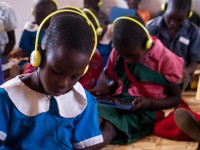 eLearning has to transform education in Africa, but it can only do so if teachers are trained in how to integrate it into their curriculum. Solen Feyissa is a Ph.D. candidate at the University of Minnesota whose research focuses on learning technologies. He believes that in order for eLearning to thrive on the continent, it must make learners feel as if they are part of a knowledge community.
eLearning has to transform education in Africa, but it can only do so if teachers are trained in how to integrate it into their curriculum. Solen Feyissa is a Ph.D. candidate at the University of Minnesota whose research focuses on learning technologies. He believes that in order for eLearning to thrive on the continent, it must make learners feel as if they are part of a knowledge community.
“Social constructivism is the idea that learning happens in a social space and is not divorced from the things we experience,” Feyissa explained to eLearning Africa. “It acknowledges that knowledge is constructed through our own daily experiences, and social interaction plays a role in the knowledge we create.”
Feyissa mentioned Ning, a social networking site he thinks can offer teachers a social network for students to communicate and build knowledge together (though the site attracted some negative publicity when it discontinued its free offerings, there are a number of great Ning alternatives, including CubeTree, Jabster and ShoutEm).
The point is to ensure that students are active agents in the creation of their own education. Feyissa is from Ethiopia, and there he saw first hand how access to ICT is not enough to create an innovative learning environment; teachers must also be involved or computers will go to waste. He mentioned a computer lab at a school where he used to teach in which most of the computers weren’t even plugged into the wall.
“It’s not enough for students to be online in a classroom — we need to go outside of that. We need to be connected through blogs and Twitter so that learning becomes a conversation you have with the outside world.”
At eLearning Africa 2016, Feyissa’s goal is to spark a dialogue about what kind of Western pedagogies might work well in Africa —and which ones won’t. “Just because a pedagogical approach works in the Western hemisphere, it doesn’t mean it’s going to work well in Africa. We need to look at things differently in Africa, and we need to train educators to think about pedagogy differently. That’s what we’re bringing to this workshop.”
Africa, of course, is not a continent about which one can make generalizations, but there are some commonalities among the problems various African communities face when integrating ICTs into their classrooms. “There are a number of situations in which hardware is brought into schools, but not enough thought is put into training for educators,” Feyissa said. Some of the research Feyissa and his colleague Dr. Angelica Pazurek have engaged in regards the ICT infrastructure in Africa and how it impacts teaching in the classroom.
Overall, Feyissa is more interested in sparking a dialogue at eLearning Africa than in anything else. He wants educators and professionals who attend his workshop to reflect upon the way they use ICTs in their own classrooms and how it impacts learning. (He was also quick to credit Dr. Pazurek with many of the ideas he’s bringing to the table; unfortunately we were unable to connect with her before publication of this article).
Feyissa is hopeful that participants will walk away with a greater awareness of new technologies in terms of their relevance and pedagogical utility within their own classroom endeavours. He said that in his experience as an educator in Ethiopia, he saw computers playing “essentially no role” in teaching experiences — and that was just a year ago.
“It’s vital that we have a conversation about this and understand how technology can be more of an educational equalizer.”
Join Solen Feyissa’s preconference workshop at eLearning Africa 2016 on Tuesday, May 24th, 2016.



















“It’s not enough for students to be online in a classroom — we need to go outside of that. We need to be connected through blogs and Twitter so that learning becomes a conversation you have with the outside world.”
That is very true. Limiting learning to only what is taught, learnt and experienced in the four walls of a classroom is robbing learners of a rich learning experience that social media such as Twitter, Facebook and blogs afford a learner to interact with educators and learners beyond the classroom walls.